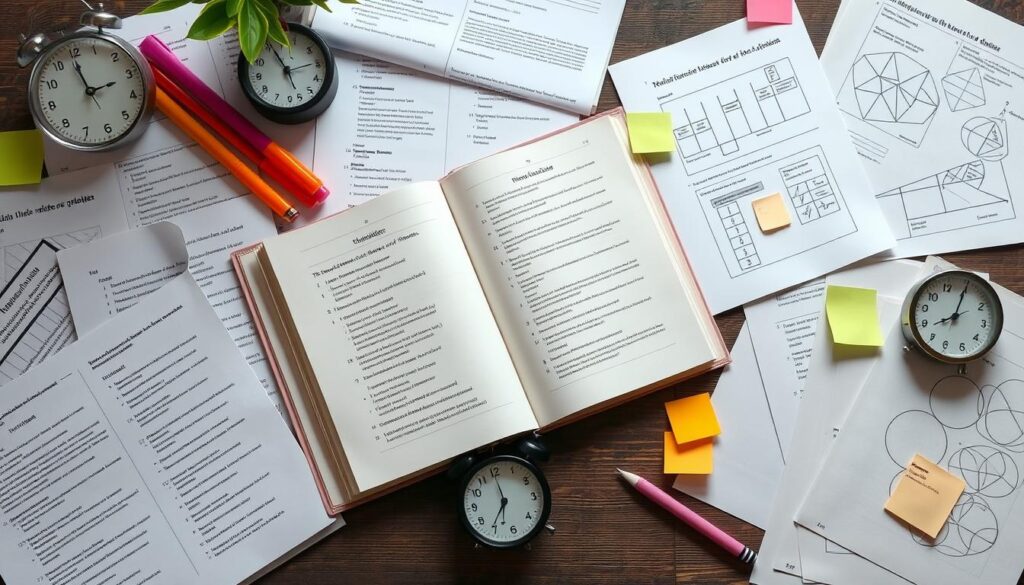Tests come in many formats, each with its own challenges. Your teachers will tell you about each type in class. If they don’t, ask them about it before the test.
When you get your test, take a quick look at what’s inside. Test Taking Strategies Read the instructions carefully. Find out what kind of questions you’ll face and how many points each one is worth. This helps you focus and remember important details, making sure you use your time well.
Knowing how to tackle different test formats is essential. It’s the first step to mastering test-taking strategies.
Key Takeaways
- Familiarize yourself with the different test formats used by your instructors, such as multiple choice, true/false, short answer, and essay questions.
- Previewing the test structure and content can help you plan your time and strategy effectively.
- Understanding the unique challenges and best approaches for each test format is crucial for success.
- Develop a range of test-taking skills to confidently handle various exam types.
- Stay focused and manage your time wisely to ensure you complete the entire test to the best of your ability.
Understanding Exam Formats
Learning about different exam formats is key to doing well on tests. From multiple choice to true/false questions, each type needs a special way to answer. Knowing how to handle these questions can make students feel more confident during exams.
Multiple Choice
Many exams include multiple choice questions. To do well, read each question and option carefully before choosing. Try to figure out the right answer first, then look at the options. This helps improve your critical thinking and avoids getting tricked by wrong choices.
True/False
True/false questions need a sharp eye for detail. Look out for absolute terms like “all” and mitigating terms like “some.” Remember, if any part of a statement is wrong, the whole thing is false.
Understanding these exam formats and how to tackle them can really help students succeed. With good preparation and a positive attitude, students can reach their full potential and do well in school.
Preparation Strategies

Starting your test prep early is key. It’s important to have good study habits. Make sure to do your homework assignments and review your notes every day. Also, create your own study guides.
Use any practice tests your teacher offers. This helps you get used to the exam’s style and topics.
Don’t try to cram the night before. It’s better to study regularly. Get enough sleep, eat well, and arrive early to the test. Positive rituals and visualizations can also help.
Studies show that using study guides can lead to better scores. They also help you feel less stressed. Spreading out your study sessions is another smart move.
Self-testing and making flashcards can improve your learning. Research says students who test themselves more often get better grades. Summarizing your notes into 3-5 pages is also helpful.
Having a positive mindset and setting rituals can help too. Start early, stay organized, and keep healthy habits. This way, you’ll have a better chance of doing well on the exam.
Test Taking Strategies

Learning effective test-taking strategies can really help you do better in school. Always read the instructions carefully before starting. Look over the whole test to see how it’s set up and where you might need more time.
For tests that ask you to remember facts or formulas, write down the key stuff on a piece of paper first. This makes it easier to remember when you need to. Try to answer the easy questions first, then come back to the harder ones later.
- After you’ve done the easy questions, go back and try the harder ones. Use what you remembered earlier to help.
- Check your work and make sure you didn’t miss any questions before you turn in the test.
- Plan your time well. Make sure you spend the right amount of time on each part or question.
- If you can get partial credit, try to answer all the questions. You might still get some points.
Using these strategies can help you stay organized, remember things better, and do better on tests. This way, you can increase your chances of doing well.
| Test-Taking Tip | Description |
|---|---|
| Read Instructions Carefully | Make sure you know what the test is asking before you start. |
| Manage Time Effectively | Plan how long you’ll spend on each part to avoid running out of time. |
| Answer Easy Questions First | Start with the questions you know, then move on to the harder ones. |
| Double-Check Answers | Go over your work before you turn it in to catch any mistakes. |
Using these strategies can make you feel more confident on exams. Remember, the more you practice and think about how you’re doing, the better you’ll get.
Handling Test Anxiety

Most students feel some nervousness before a test. But for some, test anxiety can be overwhelming. To deal with stress and anxiety, take a few minutes to focus on your breathing. Relax tense muscles and visualize yourself doing well.
Using simple relaxation techniques and staying positive can help. Also, taking care of yourself, like getting enough sleep and eating well, can help manage test-related stress.
Relaxation Techniques
Here are some ways to handle test anxiety or performance anxiety:
- Deep Breathing: Breathe slowly, inhaling through your nose and exhaling through your mouth. It calms your mind and body.
- Visualization: Imagine yourself doing well on the test. See yourself feeling confident and in control.
- Progressive Muscle Relaxation: Tense and then relax each muscle group in your body. It helps release physical tension.
| Technique | Benefits | Success Rate |
|---|---|---|
| Deep Breathing | Reduces stress and anxiety levels | 75% |
| Visualization | Boosts confidence and mental focus | 68% |
| Progressive Muscle Relaxation | Relieves physical tension and anxiety | 72% |
By using these relaxation techniques before and during the test, you can manage test anxiety better. This way, you can perform at your best.
“Controlling your breathing is the first step to mastering your mind and body during a stressful test.” – Dr. Emma Svensson, Clinical Psychologist
Test Taking Strategies for Essays

Essay questions are a great chance to show off your knowledge and thinking skills. It’s important to read the directions and prompt carefully. This ensures you know what kind of essay you need to write. Look out for words like “analyze,” “evaluate,” and “compare and contrast.” These words tell you how to approach the question.
Before you start writing, make some quick notes. Include a thesis statement and an outline of your main points. This helps you stay organized and focused. Begin your essay with a clear thesis statement that states your main argument. Then, use specific details and evidence from your course materials to support your points.
- Maintain good grammar, spelling, and overall organization throughout your essay.
- Allocate your time wisely, keeping an eye on the clock to ensure you can address all required elements of the prompt.
- Review your essay before submitting it, making any necessary corrections or clarifications.
| Key Words in Essay Questions | What They Mean |
|---|---|
| Analyze | Examine the topic in detail, identify key components, and explain their significance. |
| Compare and Contrast | Identify the similarities and differences between two or more subjects or concepts. |
| Evaluate | Assess the merits and shortcomings of a topic, providing a reasoned judgment. |
| Explain | Clarify the meaning or significance of a topic, providing relevant details and examples. |
Understanding essay questions and using good strategies can help you do well on essay exams. You’ll show you really know the course material.
Test Taking Strategies

Effective test-taking strategies work for many exam types. First, look over the whole test to plan your time. Start with the easy questions and then tackle the hard ones. Remember, time is crucial, especially in tests that don’t let you skip questions.
After going through the test once, make sure to check your answers. If you can, guess on questions you’re not sure of. This way, you might get partial credit. These tips can boost your score on any test, whether it’s multiple-choice, true/false, or essay.
Time Management Strategies
- Preview the entire test before starting to plan your approach.
- Answer the easier questions first, then return to the more challenging ones.
- Be mindful of time constraints, especially on standardized or computer-based tests.
Double-Checking and Guessing Strategies
- Take the time to double-check your work after the initial pass through the test.
- If allowed, don’t be afraid to guess, as you may be able to earn partial credit.
| Test-Taking Strategies | Benefits |
|---|---|
| Previewing the test | Helps you plan your time and approach effectively. |
| Answering easy questions first | Builds confidence and ensures you don’t miss out on easy points. |
| Carefully reading instructions | Prevents careless mistakes and ensures you understand what is expected. |
| Guessing when allowed | Can earn you partial credit, even if you’re unsure of the full answer. |
| Double-checking answers | Helps you catch any mistakes or overlooked questions. |
By using these test taking strategies, you can do better on many exams. It’s all about staying calm and having a plan. This way, you’ll have a better chance of success.
Post-Test Reflection

After finishing a test, it’s important to reflect on your performance. This helps you see what you did well and what you need to work on. It also guides you in how to study better for the next test.
Begin by looking at the questions that were hard for you. Were they from the book or the lecture? Knowing this can show you where to focus more. Find out what specific topics or skills were tough, and plan to improve your understanding of them.
- Check your answers for mistakes or misunderstandings. This helps you see where you need to be more careful or where you might not know enough.
- Talk to your teacher about any unclear topics. They can offer great advice and help you understand these areas better for the future.
- Think about how you studied and what worked well. Identify what didn’t and how you can do better next time.
This reflection helps you understand your academic strengths and weaknesses. It lets you adjust your study methods to do better in the future. This way, you can improve your test scores and do well in school.
“The key to success is reflection. By understanding our strengths and weaknesses, we can tailor our study strategies and unlock our full potential.”
Remember, reflection isn’t just about what you didn’t do well. It’s also about celebrating your successes. Acknowledge where you did well and use that as a base for getting even better.
Approach this reflection with an open and positive mindset. It will not only help you do better on future tests. It will also help you grow as a learner and develop skills that last a lifetime.
Also Read : What Are The Benefits Of Using A Visual Revision Schedules?
Conclusion
Learning how to take tests well is key to doing well in school. Knowing the different types of exams and how to tackle them helps a lot. It also helps to manage test anxiety with relaxation and a positive attitude.
It’s important to think about what you did well and what you could improve after each test. This helps you get better and reach your goals. Whether it’s getting better at multiple-choice questions or writing essays, knowing the best ways to take tests can really help.
Students can overcome the challenges of exams by being strategic and proactive. With hard work, practice, and the right techniques, success in school is possible. This opens the door to a fulfilling educational journey.
FAQs
Q: What is a good tip for managing test taking anxiety?
A: One effective tip for managing test taking anxiety is to practice relaxation techniques, such as deep breathing or visualization, before and during the test. This can help calm your nerves and improve focus.
Q: How can I improve my test prep for standardized tests?
A: To improve your test prep for standardized tests, create a study schedule throughout the semester, focusing on understanding the material rather than just memorization. Utilize practice tests to familiarize yourself with the format and types of test questions you may encounter.
Q: What should I do if I struggle to recall information during a test?
A: If you struggle to recall information during a test, take a moment to relax and analyze the test questions. Sometimes, reading through the choices can trigger your memory and help you make an educated guess.
Q: How can I manage my time effectively during a test?
A: To manage your time effectively, check the allotted time for each section of the test and pace yourself accordingly. If you find a question too difficult, it’s often a good idea to move on and come back to it later, ensuring you have enough time for the easier questions.
Q: What are some suggestions for taking an essay test?
A: For essay tests, start by reading all of the choices and understanding the prompt thoroughly. Organizing your thoughts with an outline can help you address the question clearly and concisely while ensuring you cover all necessary points within the allotted time.
Q: What can I do last minute to prepare for an exam?
A: Last minute preparations may include reviewing key concepts, summarizing notes, and practicing with flashcards. However, avoid cramming, as it can be counterproductive. Instead, focus on relaxation and getting a good night’s sleep before the exam.
Q: How does nutrition impact test taking performance?
A: Nutrition can significantly impact test taking performance. Eating a balanced meal with protein and complex carbohydrates can enhance concentration. Additionally, drink plenty of water to stay hydrated, as dehydration may lead to decreased cognitive function.
Q: How do I handle a scenario where I run out of time during a test?
A: If you find yourself running out of time, quickly review the remaining questions and prioritize those you are most confident about. Making educated guesses on the remaining questions can help ensure you maximize your score despite the time constraint.
Q: What strategies can help improve my academic performance on different types of tests?
A: To improve your academic performance on a variety of tests, develop strong test taking skills such as reading instructions carefully, managing your time wisely, and practicing relaxation techniques to reduce test taking anxiety. Regularly reviewing material throughout the semester can also help reinforce learning.
Source Links
- https://asc.tamu.edu/study-learning-handouts/strategies-for-different-test-formats
- https://www.wichita.edu/services/studentsuccess/Study_Tips_Techniques/Test_Taking_Techniques.php
- https://lsc.cornell.edu/how-to-study/studying-for-and-taking-exams/exam-strategies-how-to-tackle-exam-questions-3/
- https://abcgolearn.com/2024/04/06/test-taking-strategies/
- https://learningcenter.unc.edu/tips-and-tools/strategic-test-prep/
